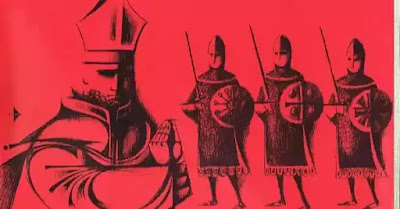Also Read
Introduction
"A form which has been perfected by one age cannot be copied exactly by writers of another age... If we write in the dramatic form and in the versification of Shakespeare we should only succeed in making rather poor imitations of Shakespeare... Hence we have to make use of suggestions from the more remote drama... such as Everyman and the late medieval Morality and Mystery plays, and the great Greek dramatists." (Eliot on Poetic Drama)
 |
| Classical influence |
Simplicity, symmetry and austerity
Though Murder in the Cathedral has a historical basis for its plot, Eliot has rigidly excluded everything superfluous and focuses attention on the central theme, the martyrdom of Becket. The plot construction is simple; there is no devious complicated action. There is also a symmetrical structure. The play opens and ends with the Chorus. There is a parallel between the four Tempters in the four Knights and their roles. Dramatic intensity is gained by the concentration on the last few days in Becket's career. The classical device of retrospective narration is used to provide information about historical events which took place before the martyrdom. These earlier events are not enacted on stage. A part of Becket's career is thus revealed through his dialogue with the Tempters.
Classical Unitiees
The Unities of time, place and action have also been observed. The action is confined to the period immediately before and after the climactic deed. The play is concerned with a single action - the martyrdom of Becket. The episodes depicted are directly connected with the martyrdom and follow each other closely and do not disturb the unity of time. The time of the action is short, the play opens on 2nd December, 1170 and concludes on 19th December, 1170. The entire action takes place in the Cathedral of Canterbury or just outside it.
Characters
The tradition of classical drama demands a minimum number of characters. In this play, Eliot concentrates on the main figure, the other characters being more or less symbolic figures. The secondary characters who are few in number have not been individualized greatly. The use of a messenger is also a classical device. The function of the Herald in Greek drama has been given to the Messenger in his arrival on stage, to announce the arrival of the chief protagonist.
Moral in tone
The classical drama is religious and moral in tone. Eliot's play too has its touch of morality. It has a ritual pattern and its theme is of martyrdom and as such appeals strongly to a sense of the religion.
Sense of Fate or Nemesis
Greek tragedy has an enveloping atmosphere of inevitable Fate or Nemesis. The audience is made to feel the imminence of catastrophe throughout the play. This idea of impending doom is very much there in Eliot's play:
"destiny waits for the comingDestiny waits in the hand of God, Shaping the still unshapen.Nothing lasts, but. the wheel turns".
Lines such as these - and there are many more-make one feel that there is the shaping hand of Destiny behind all that happens. Moreover, it gives an awesome atmosphere to the play. But it is to be noted that the sense of Nemesis, Murder in the Cathedral is connected with the Christian idea of sin and atonement: sin and suffering for that sin; action and suffering.
Poetic under pattern of classical myth
The critics have pointed out the close parallel between the death and martyrdom of Thomas in a cathedral and the death of Oedipus in sacred wood. Oedipus is tempted to leave the wood. Thomas is opted to compromise his principles. Both refuse to surrender to these temptations. Both suffer and learn the importance of patience. Both sacrifice themselves for the benefit of their people. The death of us brings fertility and prosperity to his land. Becket's death brings benefit in a Christian sense: martyrdom fructifying the lives of the common people. The play has been further enriched by the analogy of Becket's death to the suffering and crucifixion of Christ.
The Chorus
A very important influence of classical drama on Murder in the Cathedral is the use of the Chorus. Eliot does not copy the Greek use of Chorus completely, but he borrows their main functions;
"It mediates between the action and the audience, it intensifies the action by projecting its emotional consequences so that we as the audience see it doubly, by seeing its effect on other people", (Eliot.)Eliot thus restores "the full-throated Chorus of Greek tragedy" but enlarges its original function in the light of the Christian liturgy. It represents the common people and mediates between audience and action, as in Greek drama. But as Raymond Williams notes, it is a choir as well - "the articulate voice of the body of worshippers."
"Forgive us, O Lord, we acknowledge ourselves as types of the common man...Lord, have mercy upon us.Christ, have mercy upon us."
The critics have been unanimous in according praise to the Chorus in Murder in The Cathedral. In the Chorus we find a development from an initial fear to the ultimate acceptance of Thomas's martyrdom and, its true significance. The Chorus provides both background and counterpoint to the action, and it is through its reaction to the events of the martyrdom of Thomas, that the tension and atmosphere are built up and maintained. As John Peter says, "Like their equivalent in Greek tragedies they present a commentary on the action, anticipating and preparing us for developments, rousing us with their passionate dithyrambs to participate whole-heartedly in the emotional crisis, supplying the action with the background that is like music; pervasive". Also, some of the play's best poetry is to be found in the passages chanted by the Chorus.
Conclusion
Thus we see that in writing Murder in the Cathedral, Eliot has used many classical or Greek elements. It would be justifiable to say that the play is classical both in form and content.